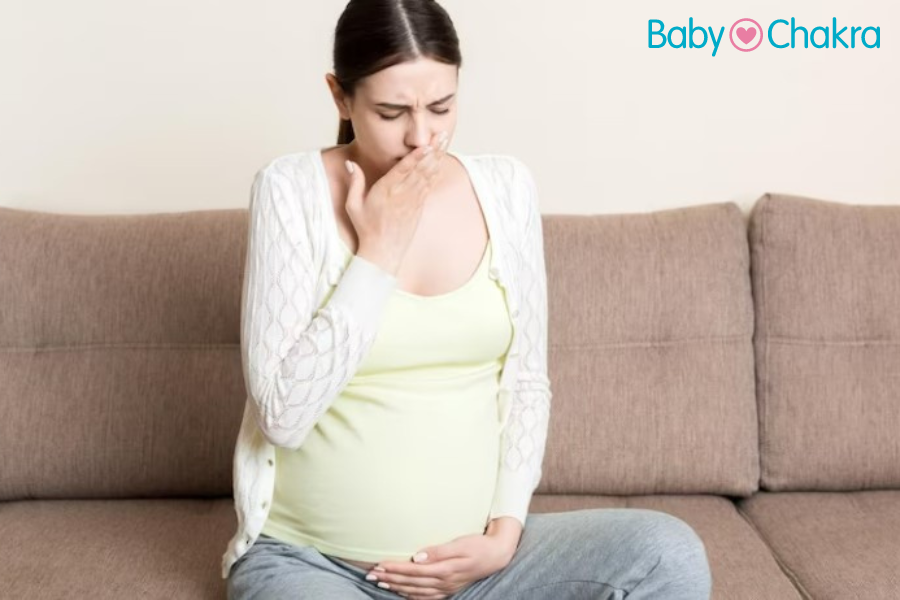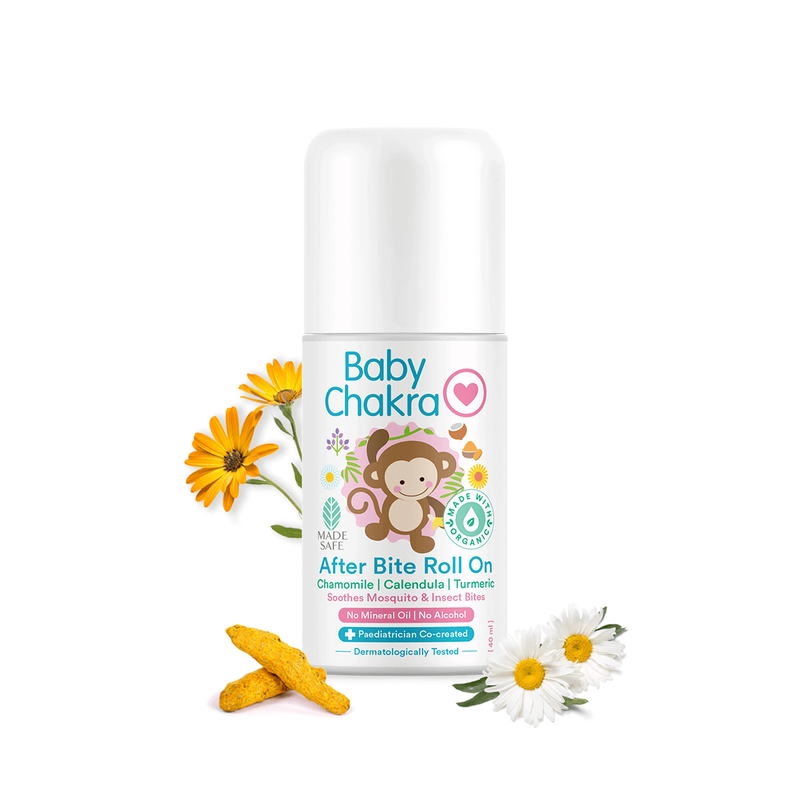
7 Possible Reasons For Third Trimester Nausea And Preventive Measures
20 Apr 2023 | 6 min Read
Sudeshna Chakravarti
Author | 799 Articles
In most women, nausea and vomiting subside by the 16th week of pregnancy. However, in some cases, you may experience third trimester nausea, vomiting, and other associated discomforts. In fact, a study by the National Library of Medicine stated that about 20% of pregnant women experience nausea in their third trimester.
While the exact cause of nausea and vomiting during pregnancy is unknown, knowing and avoiding its triggers can help you manage this condition. The occasional occurrence of nausea or vomiting in the third trimester may not be a cause for concern. However, seek medical assistance if you persistently experience these symptoms throughout your pregnancy.
Read on to know more about the common triggers of third-trimester nausea and preventive methods to soothe this condition.
Possible Causes Of Third Trimester Nausea
Hormonal and dietary changes are associated with nausea and vomiting during the third trimester / Image credit: Freepik
As you may know, increasing HCG levels are one of the reasons for first trimester nausea. However, it can be difficult to determine the exact cause of nausea in the third trimester.
The following could be some of the possible reasons why you are experiencing nausea during the third trimester of pregnancy.
- Fluctuating hormones: Frequent changes in your hormones may cause vomiting and nausea in the third trimester.
- Growing baby: As your growing baby exerts pressure on your digestive system, you may experience symptoms like heartburn, nausea, and vomiting.
- Changes in your body: Bodily changes, sleep disturbances, and stress and anxiety about labour and childcare may lead to vomiting and nausea in the third trimester.
- Diet: Consuming too spicy, acidic, and greasy foods can exacerbate vomiting and nausea during pregnancy. Hence, track your diet, and avoid foods that may cause nausea.
- Fatty liver during pregnancy: This condition is better known as acute fatty liver during pregnancy (AFLP). It is considered a rare but serious problem during pregnancy. It is usually diagnosed during the third trimester and may lead to nausea and vomiting.
- Preeclampsia: The sudden incidence of nausea during pregnancy may also be associated with preeclampsia. This condition is characterised by high blood pressure and can pose serious complications if left untreated. Inform your healthcare provider if you experience nausea accompanied by severe headache and vomiting.
- HELLP syndrome: This syndrome is associated with blood and liver problems during pregnancy, and may cause vomiting and nausea in the third trimester.
Helpful Tips To Prevent Third Trimester Nausea
The following guidelines can help prevent nausea and vomiting during the third trimester of pregnancy.
- Try to get plenty of sleep and rest
- Avoid caffeinated beverages, such as coffee and energy drinks as they may worsen your symptoms.
- Consume lots of fluids including 8-10 glasses of water to avoid nausea and associated dehydration.
- Eat smaller, yet frequent meals throughout the day.
- Practice gentle exercises and stretches after consulting your doctor
- Avoid lying down immediately after your meals, and have your dinner at least 1-2 hours before bedtime.
- Identify foods that trigger or aggravate your symptoms and try to avoid them.
- Certain smells and fragrances can trigger your nausea. Identify those scents and steer clear of them.
- Have bland food to soothe nausea during pregnancy. Foods like popsicles, rusk, chicken broth, and bananas can alleviate your symptoms.
- You can also consider having ginger to reduce nausea and vomiting.
- Stay in lighted and well-ventilated areas as closed spaces may also aggravate your vomiting and nausea.
7 Foods That Help Fight Third Trimester Nausea And Vomiting
Chamomile, peppermint, and cloves exhibit anti-nausea effects and help alleviate your symptoms / Image credit: Freepik
In case you are feeling too nauseated, you can consider adding these foods to your pregnancy diet to tackle your symptoms.
- Chamomile: Chamomile exhibits antioxidant properties and can be used for relief from nausea and vomiting. Have a cup of chamomile tea in the morning to soothe your symptoms.
- Peppermint: It has anti-nausea effects and can also help enhance your taste buds after vomiting. Having peppermint tea or sucking a peppermint candy can be useful.
- Broccoli: The folic acid in broccoli helps reduce nausea during pregnancy. You can have broccoli soup made with ginger and a pinch of red pepper to alleviate your symptoms.
- Fennel seeds: Chewing a handful of fennel seeds can offer relief from pregnancy nausea. You can also try making fennel tea, by soaking a cup of fennel seeds in a cup of hot water. Add honey to enhance the taste and drink it in the morning.
- Yogurt: Yogurt is rich in probiotics that help regulate your digestive system. It also contains vitamin B12 which is effective in reducing morning sickness. You can add fresh fruits to yogurt, or have a yogurt-based smoothie.
- Kiwi: Kiwi also exhibits anti-nausea effects and boosts your energy levels. You can have a kiwi smoothie, and add blueberries or bananas to it.
- Cloves: The aroma of cloves may help reduce the queasy feeling in your stomach. You can try chewing a clove, or roast them and have them with honey. Drinking clove tea might also help tackle your symptoms.
When To See A Doctor?
While experiencing nausea or vomiting during pregnancy is not considered a serious problem, you should consult your doctor immediately in the following scenarios.
- Loss of appetite
- Inability to keep food and liquids down
- Sudden weight loss
- Severe fatigue
- Reduction in fetal movement
- Lightheadedness
- Several episodes of vomiting throughout the day
Conclusion
While third trimester nausea is rare, its occurrence should be immediately reported to your healthcare provider. If left unattended, this condition may lead to dehydration, and also increase the risk of other pregnancy complications.
You can also try avoiding triggers that exacerbate your symptoms. For instance, avoid having spicy or greasy foods, and try to have smaller portions of meals frequently throughout the day. Additionally, make sure to drink plenty of water, and take adequate rest to manage your symptoms.
Check Out These Newborn Care Products:
Moisturising Creamy Bathing Bar
Also Read:
Sugar during pregnancy: How much sugar can you safely consume during pregnancy? Tap this post to know.
Acupuncture during pregnancy: Learn all the benefits of acupuncture during pregnancy, and when you should consider getting this procedure.
Contractions during pregnancy: What are the different types of contractions experienced during pregnancy? Tap this post to know.
Cover Image Credit: Freepik.com
A


Related Topics for you
Suggestions offered by doctors on BabyChakra are of advisory nature i.e., for educational and informational purposes only. Content posted on, created for, or compiled by BabyChakra is not intended or designed to replace your doctor's independent judgment about any symptom, condition, or the appropriateness or risks of a procedure or treatment for a given person.



